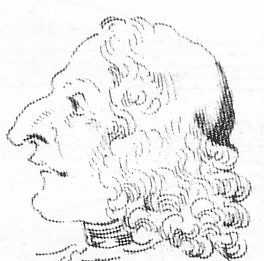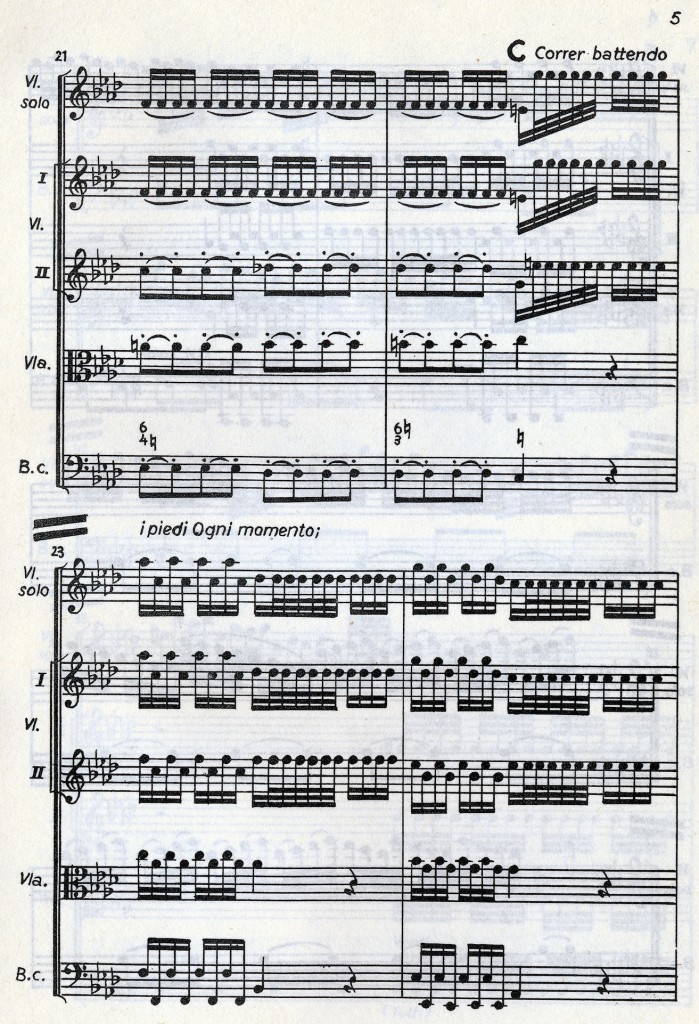Antonio Vivaldi (1678-1741)
Born March 4, 1678 in Venice, Italy.
Died July 28, 1741 in Vienna, Austria.

Winter from the Four Seasons, Opus 8, Number 4
Published: 1725.
Instrumentation: Solo violin, strings, and continuo.
Duration: ~9 min.
Antonio Vivaldi received his early musical training from his father Giovanni, who was a professional violinist at St. Mark’s Basilica in Venice. Giovanni used the surname Rossi, which implies that the red hair which gave Antonio the nickname “il prete rosso” (The red priest) was hereditary. Antonio was ordained as a priest in 1703, but was essentially thrown out for “conduct unbecoming a priest” (whatever that could be) in 1737.
In 1703 Vivaldi became the Maestro di Violino at the Seminario Musicale dell’Ospedale della Pietà in Venice which was an institution for orphaned or abandoned girls. The all-girl orchestra became quite famous and a bit of a tourist attraction. Besides his teaching duties, Vivaldi wrote a great deal of music for these young musicians, including hundreds of concerti.
Vivaldi wrote music in many genres including 46 Operas, oratorios, cantatas, sundry church music, and sonatas, but he is best known for his concerti – the solo concerto in particular.
The snarky comment that “Vivaldi composed the same concerto 400 times” is amusing, but the simple fact that no less than J.S. Bach held Vivaldi’s concerti in such esteem that he transcribed and arranged many of them, shows that it is unfair.
What we know as the Four Seasons was part of a larger collection of concerti entitled Il Cimento dell’Armonia e dell’Invenzione (“The Contest Between Harmony and Invention”). The collection was published in 1725 as his Opus number 8. Each of these four concerti are for solo violin with strings and continuo, and each are three movements that are fast, slow, then fast.
The three movements in the Winter concerto are marked:
I Allegro non molto
II Largo
III Allegro
The phrase “program music” still had to wait 200 years for Liszt to invent. But Vivaldi was indeed inspired by non musical sources. Vivaldi wrote that one of his inspirations for the Four Seasons was the landscape paintings by Marco Ricci (1676–1730) . Vivaldi included descriptive sonnets before each concerto in the published score. It is probable that he wrote them himself. Each line of the sonnet is enumerated as a letter, which is printed at the top of the staves of the music. This creates a clear connection for us between the imagery of the words and music. There are many wonderful musical illustrations describing teeth chattering, foot stamping, and strong winds. I particularly like his depiction of rain in the middle slow movement. The pizzicato strings play at different speeds just like rain drops.
Sonneto Dimostrativo sopra il concerto intitolato L’Inverno
| L’Inverno | Winter |
| Allegro non molto | |
| Aggiacciato tremar trà nevi algentí Al Severo Spirar d’ orrido Vento, Correr battendo i piedi ogni momento; E pel Soverchio gel batter i denti; |
Frozen and shivering in the icy snow. In the strong blasts of a terrible wind To run stamping one’s feet at every step With one’s teeth chattering through the cold. |
| Largo | |
| Passar al foco i di quieti e contenti Mentre la pioggia fuor bagna ben cento Caminar Sopra il giaccio, e à passo lento Per timor di cader gersene intenti; |
To spend the quiet and happy days by the fire Whilst outside the rain soaks everyone. To walk on the ice with slow steps And go carefully for fear of falling. |
| Allegro | |
| Gir forte Sdruzziolar, cader à terra Di nuove gir Sopra ‘l giaccio e correr forte Sin ch’ il giaccio si rompe, e si disserra; |
To go in haste, slide and fall down: To go again on the ice and run, Until the ice cracks and open. |
| Sentir uscir dalle ferrate porte Sirocco Borea, e tutti i Venti in guerra Quest’ é ‘l verno, mà tal, che gioia apporte. |
To hear leaving their iron-gated house Sirocco, Boreas and all the winds in battle: This is winter, but it brings joy. |

It is hard for us to believe now that Vivaldi was “forgotten” until after World War II. Actually he wasn’t totally forgotten. In particular the Primavera concerto was always around and rearranged. But in the past 60 years his popularity has skyrocketed, in no small part due to The Four Seasons. A current search at a popular online music store will return over 12,000 matches for The Four Seasons alone! Even better, his lost scores continue to be discovered and performed. Recently a Czech harpsichordist, Ondrej Macek, discovered the score to most of his opera Argippo. It was performed in 2008 for the first time since 1730!
[amazon template=iframe image&asin=B011NBHV4C][amazon template=iframe image&asin=B000002994]
[amazon template=iframe image&asin=0634078976][amazon template=iframe image&asin=048628638X][amazon template=iframe image&asin=048640644X]